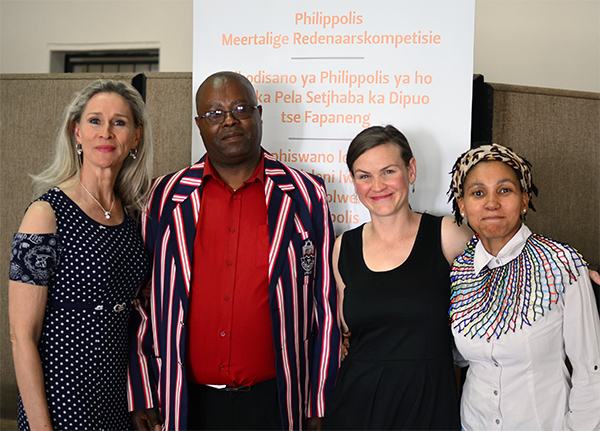Latest News Archive
Please select Category, Year, and then Month to display items
03 January 2020
|
Story Xolisa Mnukwa
|
Photo Supplied
 The UFS Bloemfontein Campus, South Campus, and Qwaqwa Campus choirs are student-centred choirs functioning under the Student Affairs’ Arts, Culture and Dialogue office.
The UFS Bloemfontein Campus, South Campus, and Qwaqwa Campus choirs are student-centred choirs functioning under the Student Affairs’ Arts, Culture and Dialogue office.
It has been a noteworthy year for the University of the Free State (UFS) Choir, establishing itself on the student/university choir scene. The choir, based on the Bloemfontein Campus, represented the UFS at the bi-annual KUESTA choir festival earlier this year, showcasing its musical talent. The choir shared a stage with other university choirs from around the country.
The UFS (Bloemfontein Campus) Choir is a 42-member ensemble of students; the other two choirs, based on the South and Qwaqwa campuses, consist of 40 and 62 members respectively. The choirs are administered and managed by the Division of Student Affairs’ Arts, Culture and Dialogue Office. In addition to Kovsie culture, the choirs strive to have a varied repertoire of inclusive music, with the UFS BFN Campus choir performing a diversity of songs in English, Afrikaans, isiXhosa, and Sesotho.
The new South Campus choir was established in 2018 and is led by choir director, Bonisile Gcisa, who specialises in choral music. This leg of the choir will therefore perform many of his works, but will also include some of the Bloemfontein choir’s set lists, since most of the choir members will be auditioning in 2021 for the Bfn choir when they change campuses.
The Qwaqwa Campus choir will lean more towards a choral genre under the direction of Sipho Khumalo.
The UFS Bloemfontein Campus choir was officially re-established under the leadership of choir conductor Leona Geldenhuys in March 2018, and has performed at several events, including the Rector’s Concert, the annual KUESTA choir convention, and the Bloemfontein Choir invitational. The group has also held a number of public performances on the Thakaneng Bridge at the UFS Bloemfontein Campus.
“Part of the UFS Student Affairs’ objective is to create an inclusive and a socially just student lived experience, and that is the mandate the choirs will also adopt. We hope to create an experience that not only enhances our students’ singing abilities, but also contribute to a more inclusive university experience.” – Angelo Mockie – Director: UFS Student Affairs Arts, Culture and Dialogue office.
“Rest well, be safe, and return rejuvenated,” were his parting words to students for the festive season.
Competition emphasises value of mother-tongue education
2017-11-02

At the recent Multilingual Debating Competition were, from the left: Anita Muller,
local facilitator; William Magwa, master of ceremonies; Dr Chrismi-Rinda Loth,
project coordinator in the Unit for Language Facilitation and Empowerment; and
Mabatho Ntsieng, project facilitator in Community Engagement.
Photo: Supplied
The Multilingual Public Speaking Competition has been an annual event in Philippolis since 2013. The competition was established as a result of the Multilingual Information Development Programme (MIDP), a project sponsored by the province of Antwerp in Flanders, Belgium.
The competition is jointly hosted by the Unit for Language Facilitation and Empowerment (ULFE) at the University of the Free State (UFS) and the Department of Community Engagement, also from the UFS.
Debating in your home language
Grade 6 to 9 learners from four schools participated in this year’s competition. Bergmanshoogte Intermediate School, Madikgetla Primary School, Williamsville Primary School, and Springfontein Primary School each entered their three best speakers per grade.
Olerato Tshiloane, a Grade 7 learner from Madikgetla Primary School, was named best speaker overall.
Everyone debated on ‘Heritage’
The overall theme of this annual event was ‘Heritage’. Thirty six learners debated in their mother tongue on aspects of this theme, such as its definition, the role it plays in their lives, and the importance thereof. According to Dr Chrismi-Rinda Loth from ULFE, learners have to present their speeches in their mother tongues. “This emphasises the value of the mother tongue/home language within a teaching context,” she says.
This year’s competition saw 20 Afrikaans speeches, 13 in Sesotho, and three in isiXhosa. The multilingual adjudication panel was composed of teachers from the participating schools, and the head adjudicator from the Afrikaanse Taal- en Kultuurvereniging (ATKV). The ATKV is a partial sponsor of the competition and also provides the participation certificates.
Dr Loth says ULFE and Community Engagement are looking forward to continue their collaboration, thus contributing to the empowerment of the community.